Our mission is equity in design. Our Design Grants fund community experts to create design solutions for challenges in their neighborhoods.
Call for Proposals
Do you have ideas about community building and wellbeing, housing or transit inequities, or climate change? Is your project in Greater Boston or the Gateway Cities? Apply for a Design Grant today!
The deadline is May 1, 2024, at noon.
See our most recent Design Grants winners here.
Already familiar with the call, criteria, and guidelines? Jump straight to the application.
Grants
We will award up to 3 grants of $15,000 each to winning teams. Grants also include access to design experts.
Funding
Grant funding provides you with capacity to design the framework of your solution. Your grant work should move your project towards implementation. The Design Grants are not intended to provide operational or capital funding. To support your efforts, grants also include access to design experts at Sasaki, a world-renowned design firm.
Note: for teams that include a student member, additional funding may be available to provide a separate student stipend through state and city workforce grants.
Selection Process
Finalist teams will present their project ideas in person at Pitch Night, a public event.
A jury at Pitch Night will make recommendations to the Hideo Sasaki Foundation Board of Trustees, who will decide on funding. The audience will include other funders and design firms interested in providing pro bono consultation and/or design work. All finalist teams will receive an honorarium for their time at Pitch Night. Finalists also gain exposure to other potential project supporters.
Grant expectations
Winning teams will spend 10 months working on their proposed projects.
- You will engage in at least 3 scheduled work sessions with Sasaki designers to advance your project.
- You will gain access to monthly programming to hear from design experts on relevant topics.
- You will build connections through the Sasaki Foundation’s network.
- You will co-learn with your peers in the Design Grants cohort.
- You will deliver the following:
- Project work plan and projected budget, including specific actionable deliverables (like research, community engagement, design creation, pilot testing, or installations)
- Final report, including photos and visuals, to share as open source on our website and in the annual research publication
- Final presentation
The call for proposals
Shared Voices
Charting a Course for Community Action
The challenges in addressing environmental resilience, displacement, affordable housing, access to mobility choices, meaningful public engagement, and other social equity considerations in planning and design are so broad and complex, they require a shared approach to facilitate all the necessary conversations and deliver solutions. Most of these challenges faced by Massachusetts communities are not limited to local neighborhoods—their effects are felt and shared across the Commonwealth and beyond. Multiple futures are at stake, and we can make a difference by acting now.
The Hideo Sasaki Foundation recognizes the need for interdisciplinary approaches, diverse community voices, and regional cooperation as key drivers to find shared solutions and create shared impact.
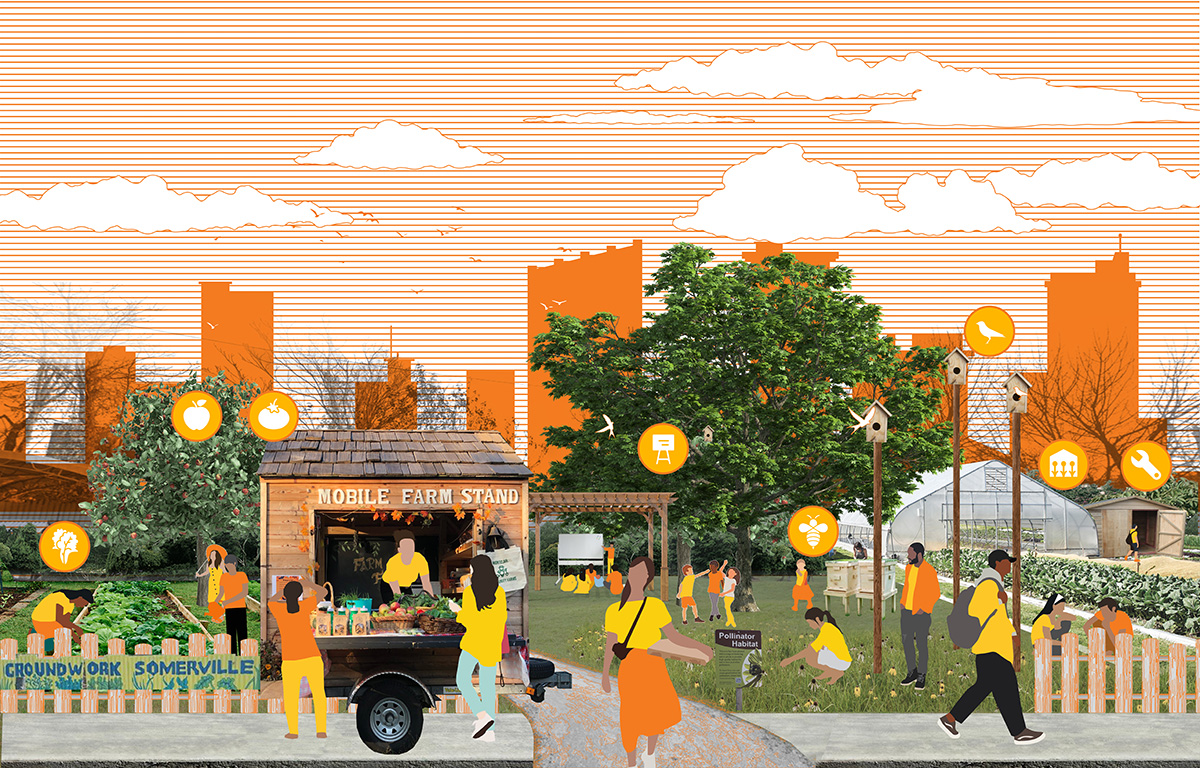
Groundwork Somerville in partnership with Sasaki
Creative Community Building
We seek themes of collective memory and community storytelling, investment in historic neighborhood fabric, and local business development. Designing and planning for our communities can extend beyond the concept of placemaking to include the idea of placekeeping—the preservation of local identity through strengthening social bonds, celebrating neighborhood history, and developing strategies for enhancing neighborhoods.
- How can we preserve a community’s cultural identity while improving its social and economic wellbeing?
- How can storytelling bridge racial divides in neighborhoods damaged by past design decisions?
- How can we build local capacity for economic development and promote local entrepreneurship?
- How can we leverage technology to give power over design to marginalized voices? What tools can we create for better and more equitable decision making?
We seek strategies to improve housing affordability, promote a more diverse housing stock, and address gentrification and displacement. Housing shortages in Massachusetts cities require innovative approaches to planning and design. Displacement of families, caused by economic and environmental forces, is exacerbated by the limited supply of affordable, family-oriented housing units.
- How can we provide better access to affordable housing for more people?
- How can we strengthen community networks as displacement increases?
- How can cities respond to increasing numbers of people experiencing homelessness?
We seek design solutions for challenges to our transportation systems. Strengthening public-private partnerships, expanding transportation choices, bringing safety to the forefront, and leveraging technology can provide a more accessible and functional transportation system. In Massachusetts, local mobility networks and regional systems have tremendous potential to improve accessibility, equity, and safety for users.
- How can we increase mobility choices and access in our communities?
- How can we ensure that our transportation system is equitable, especially for people of color and low-income neighbors?
- How can we create a safer transportation system?
- How can better access to technology improve mobility?
- How can we progress accessibility and disability rights in the design of our cities?
We seek efforts to enhance community health through the built environment. Equitable access to outdoor spaces, creative reuse of the public realm, and innovative and inclusive programming are integral to our collective community health. Codesigning innovative solutions to challenges within our built environment can begin to positively affect our physical, emotional, and mental wellbeing in cities across Massachusetts.
- How can we expand access to open space and the public realm to allow for greater health and wellness?
- How can we increase access to health and wellness opportunities?
- How can we co-create community spaces that improve our physical, emotional, and mental wellbeing?
We seek responses that address the impacts of climate change, including extreme heat, stormwater, flash flooding, and coastal and river flooding. Challenges associated with climate change, especially related to the urban heat island effect and flooding, disproportionately impact communities of color and low-income communities.
- What is a collaborative approach to mitigate and prepare for the impacts of climate change?
- What can we do to increase climate resilience in a community, and can it scale to greater impact?
- How can we empower communities to advocate for environmental justice?
- How can we provide a just transition as communities adapt to extreme weather?
We seek proposals that use interdisciplinary thinking to challenge the status quo. We support design ideas that engage and contribute to communities. Winning projects will have creative yet actionable ideas.
We seek proposals that benefit historically underrepresented communities by targeting systemic barriers. Winning projects will collaborate deeply with a community to meet its unique needs.
We value diverse perspectives. We seek to find inclusive processes that make space for dialogue and difference. We encourage proposals from women; transgender, genderqueer, or gender non-conforming individuals; members of racial or ethnic minorities; and individuals with physical and/or intellectual disabilities.
We seek proposals that foster innovation, creativity, and interdisciplinary approaches to design. Winning projects will include forward-thinking, rather than reactive, concepts and ideas.
We seek proposals that can produce positive impacts within the communities they serve. Winning projects will exhibit scalability or replicability across other communities with similar characteristics.
Our jurors are representatives from design, housing, community, and environmental organizations.
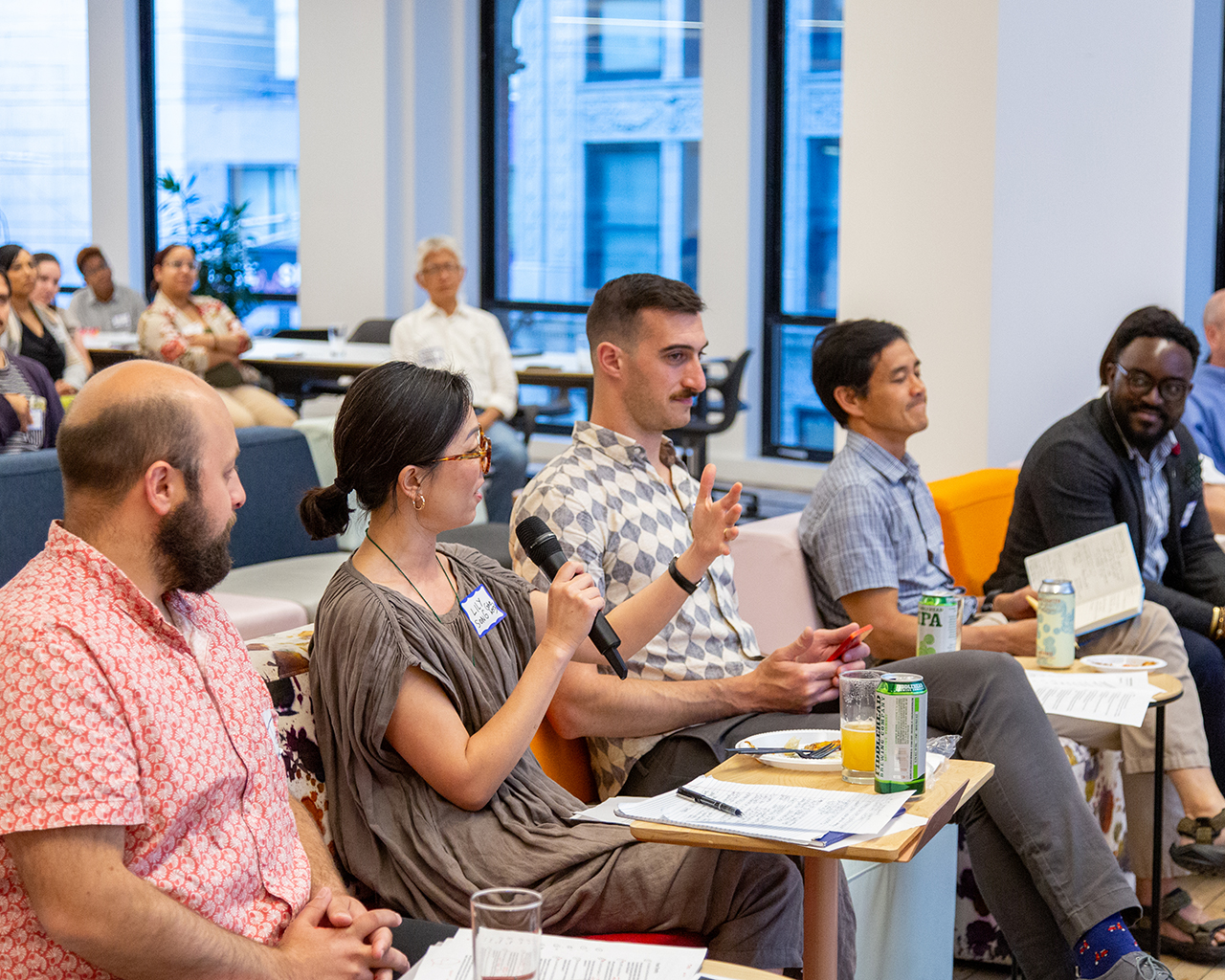
2023 Design Grants jury at Pitch Night
110 Chauncy, Boston, MA
Access to Sasaki Designers
During the 10-month grant period, winning teams will have scheduled time with Sasaki design professionals, including architects, civil engineers, graphic designers, interior designers, landscape architects, planners, urban designers, and data analytics and visualization experts. Winning teams may also benefit from Sasaki’s Fabrication Studio and design software.
Equity is one of the cornerstones of the Hideo Sasaki Foundation’s work. Winning teams must include a community advisor. This advisor can be a local leader, nonprofit professional, designer, artist, business leader, or other individual from the project’s focus community. Note: All winning projects must have a community focus in Greater Boston or the Gateway Cities.
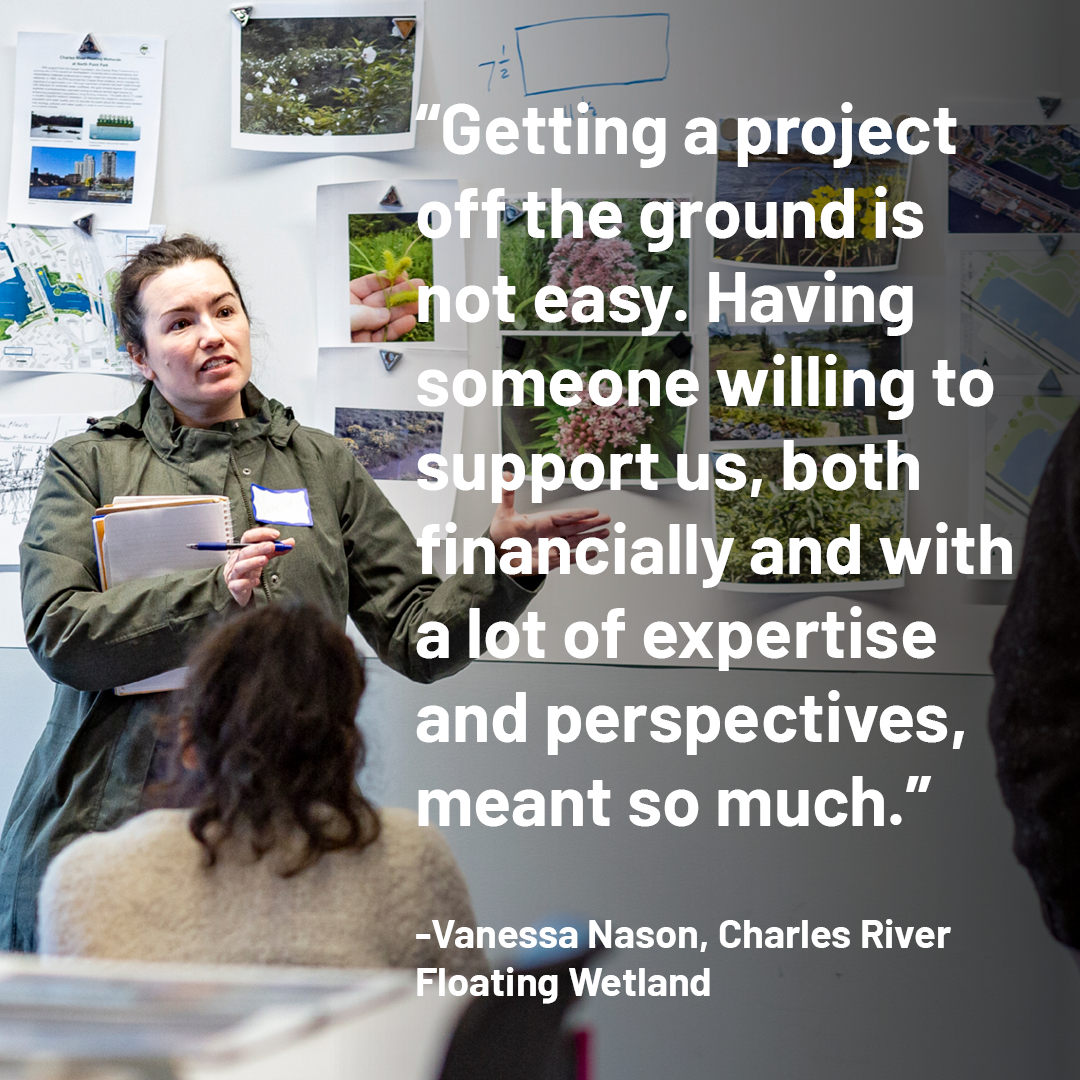
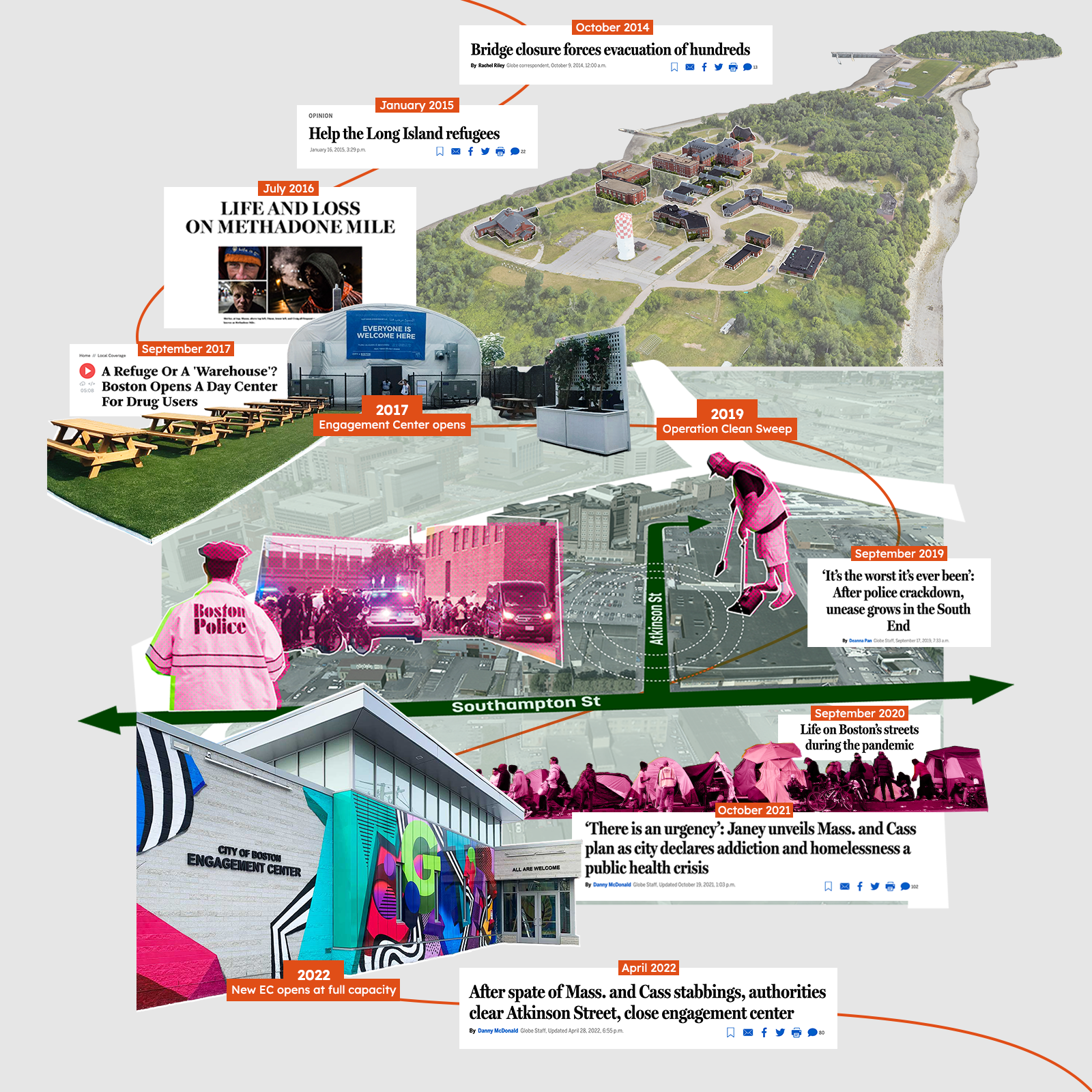
See You in the Future’s timeline graphic, created through the Design Grants process
image courtesy See You in the Future
Applicants must be teams of two to four individuals. At least one individual must be from the project’s focus community. Teams can also include individuals or representatives of nonprofits, civic, and community organizations. We encourage teams to be multidisciplinary in their composition and thinking.
Applicants must create a compelling story around how their project meets the specific needs of their focus community. This narrative must include a community outreach and engagement plan.
Applicants must submit a work plan, including projected use of grant funds and total project budget. Winning teams will connect regularly with the Sasaki Foundation. Winning teams will complete a final presentation and a final report for the annual Sasaki Foundation Design Grants Research publication.
To multiply the impact of the Design Grants, winning teams commit to their project concepts and ideas being open source.
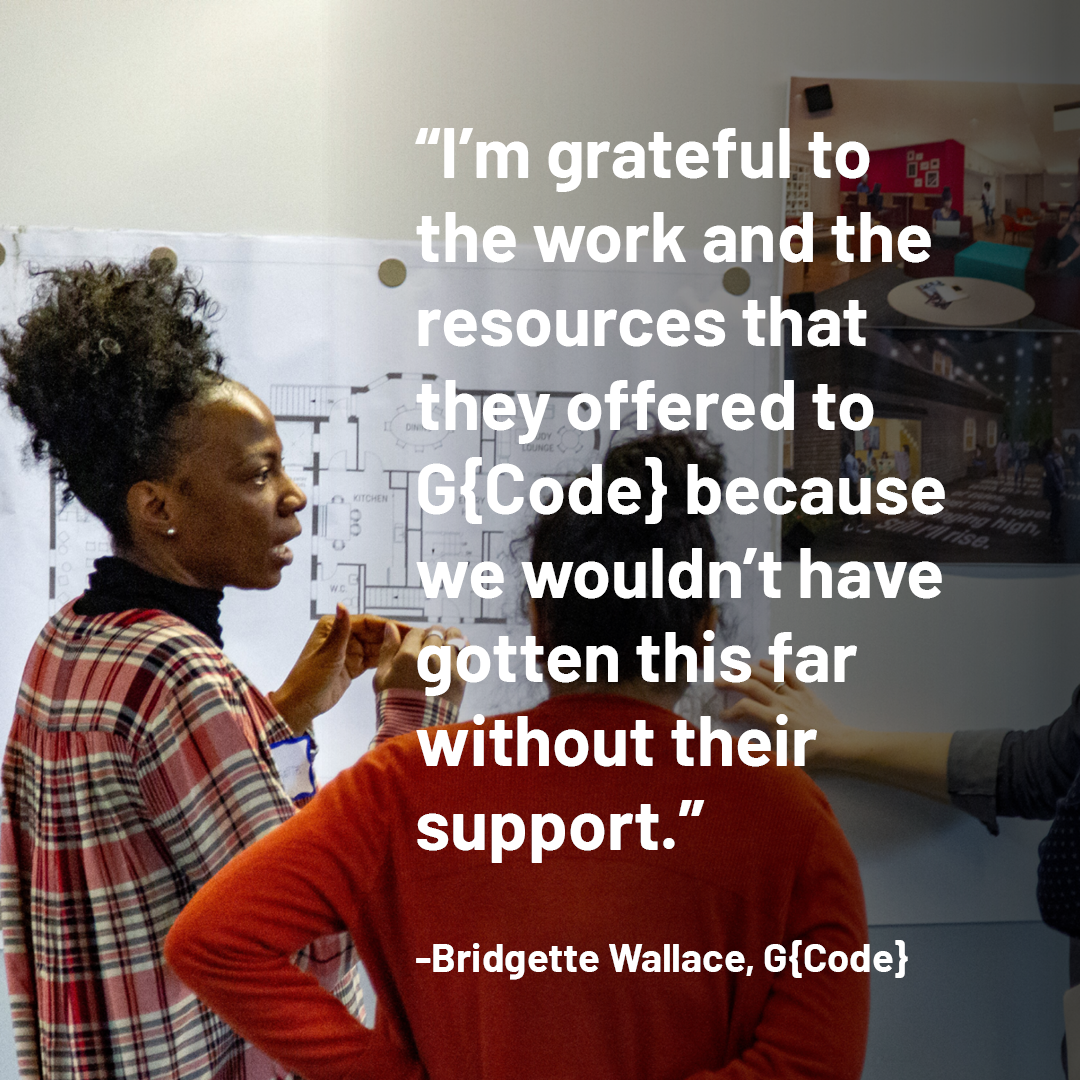
Timeline: 2024
February
March and April
Virtual office hours (15-minute slots 12-1 p.m. every Friday)
April 2
Design Grants Mixer to meet potential team members (in person at 5:30 p.m.)
April 3
Design Grants Mixer to meet potential team members (virtual at noon)
May 1
May 23
June 6
June 20
Grant winners announced
September 2024 – June 2025
Grant period
Watch the under 15-minute overview video.
Download the FAQ document, last updated February 26, 2024.
Download a text-only PDF of the call for proposals.
Sign up for office hours, available every Friday from noon to 1 p.m. in March and April.
Email info@sasakifoundation.org.
Events
Meet potential team members at one of our Design Grants Mixers. We will host an in-person mixer at 5:30 p.m. on April 2, 2024, and a virtual mixer at noon on April 3, 2024.
We will host Pitch Night on Thursday, June 6, 2024, from 5:30 to 7:45 p.m. Finalist teams will present their project ideas in person to the Design Grants jury and a public audience. All are welcome.
